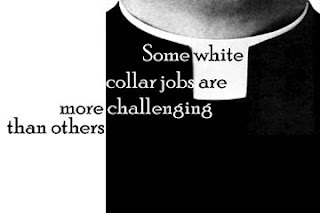
Every profession, whether formalized or not, has its continuing education needs. Doctors need to be kept abreast of the latest procedures and drugs, techies need to learn new programs, and construction workers need to brush up on new materials and methods. Jobs that require broader but less specialized skill sets are no different: real estate developers have to stay on top of interest rates and demographics and environmental standards, architects have technical and sociological considerations, and consultants just have to read everything.
And pastors? There are certainly Biblical and theological advancements to stay on top of. Some, more globally oriented congregations may require their pastors to keep abreast of missiological trends and foreign affairs.
And, I would offer, pastors need to understand the world in which their congregants live, work, play, witness, serve, laugh, and cry. They don't need to know about every profession, but they need to know something of what's going on in those professions that might be relevant to a congregant's psyche and ministry. They don't need to be as learned as a university professor of economics or sociology or communications, but they need to be aware of economic or sociological or communicative trends, and how they affect the spread of Christian or other values. They don't need to blog, tweet, or facebook, but they do need to understand how Blogger, Twitter, and Facebook are used or can be used by their congregants towards either very useful or very destructive purposes.
I'm glad that pastors who tweet or who integrate their weekly reading of Business Week into their sermons are uniformly praised for being so on the cutting edge. But I lament that such pastors are upheld as uniquely progressive, rather than it being the norm.
Should not all pastors feel the need, just like computer programmers and architects and doctors and lawyers, to stay on top of these kinds of things, lest their ministries become increasingly distant from the realities of their congregants and communities? Should not a pastor's professional development not be limited to Biblical, theological, and missiological studies, but rather how those studies intersect with the real world in which their congregants and communities live and breathe? And if so, shouldn't we be responding to a pastor who has a Facebook page or who reads the Financial Times or attends an Urban Land Institute conference, not with a "wow, s/he's so out of the box," but rather with a "of course, that makes complete sense."
Please don't misconstrue the sentiment behind this post. I'm not trying to bash on pastors; far from it. Many of my friends are pastors, and I deeply appreciate the challenges of their profession. I do not want these words to be read as a dis on more traditional forms of pastoral development, or as a complaint that pastors aren't already doing enough.
All I'm suggesting is a rethink of what it means for a pastor to do professional development. Immersing oneself in books by John Calvin and sermons by Billy Graham counts; but so too should immersing oneself in a TED conference or a neighborhood historical society committee. I don't know that I would say there are too many scholarly papers written by pastors about the New Testament, but I would say that there are too few scholarly papers written by pastors about the communicative implications of Web 2.0 or the missiological consequences of a generation weaned on reality TV. After all, we support our pastors not just so that they can learn timeless truths for themselves, but so that they can express those timeless truths within today's generation, in today's contexts, and with today's tools.


No comments:
Post a Comment